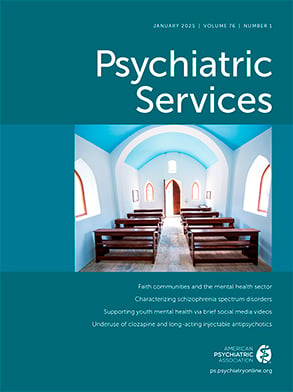Methods
COMET methods have been described previously (
1). Briefly, primary care physicians screened consecutive patients with depression in their practice for eligibility from May 2009 through February 2010. Eligible patients were adults who were diagnosed as having major depressive disorder and who were newly prescribed an antidepressant medication (no antidepressant use in the previous 120 days). The patients’ depression care was managed by the primary care physician.
The study protocol was approved by a central institutional review board. After complete description of the study at the enrollment visit, written informed consent was obtained from participants. The study was conducted in accordance with the principles of the Declaration of Helsinki, HIPAA (
3), and Good Epidemiology Practices (
4).
Primary care sites were alternately assigned to the usual care or intervention arm (cluster randomization). Patients in the intervention arm completed the nine-item Patient Health Questionnaire (PHQ-9) (
5) by telephone interview each month for six months, and the results were faxed to their physicians. Patients in the usual care arm completed telephone interviews at three and six months postenrollment, and the results were sent to their physicians only at six months.
We explored whether indicators of patient behavior (primary care office visits, antidepressant medication–taking behavior, and participation in support groups or psychotherapy or counseling) could be related to patient outcomes. For each patient, the number of office visits (all cause or depression related) during the follow-up period was collected from electronic case report forms completed by the physicians at six months.
During the three- and six-month interviews, patients in both study arms were asked about their use of medication with questions adapted from the Morisky Medication Adherence Scale (
6), including whether they were currently taking their antidepressant medication, how often they forgot to take their medication in the past four weeks, and how often they had not taken their medication in the past four weeks because they were feeling better. Recent psychotherapy or counseling and support group participation were ascertained with the questions “Over the past three months, have you received counseling or psychotherapy to help treat your depression?” and “Over the past three months, have you participated in depression support groups to help treat your depression?”
Only patients who completed the telephone survey at both three and six months were included in the analysis. Study arms were compared by using t tests or chi square tests, and multivariate regression was used to determine the effect of study arm on patient behaviors. Regression models were adjusted for baseline demographic and clinical characteristics. Due to study arm assignment by site, all comparisons were adjusted for patient clustering.
Acknowledgments and disclosures
Bristol-Meyers Squibb/Otsuka, the study sponsor, contracted with Optum to conduct the study.
Dr. Chang has received research support from Alkermes, AstraZeneca, CeNeRx, Euthymics, Forest, Johnson & Johnson, Neuralstem, and Pfizer and travel reimbursement from Bristol-Myers Squibb. Dr. Jing, Dr. Kalsekar, and Dr. Hebden are or were stockholders in Bristol-Myers Squibb. Dr. Yeung has received research support from Johnson & Johnson, Lundbeck, Methylation Sciences, Inc., and Novartis. Dr. Fava receives research support from, serves as an advisor or consultant to, has received speaking or publishing fees from, or has equity holdings in Alkermes, Inc., AstraZeneca, Belvoir Media Group, Best Practice Project Management, Inc., BioMarin Pharmaceuticals, Inc., Boehringer Ingelheim GmbH, BrainCells, Inc., Bristol-Myers Squibb, CeNeRx BioPharma, Cephalon, Inc., Cerecor, Clintara, L.L.C., CME Institute/Physicians Postgraduate Press, Inc., CNS Response, Inc., Compellis Pharmaceuticals, Covance, Covidien, Cypress Pharmaceutical, Inc., DiagnoSearch Life Sciences (P) Ltd., Edgemont Pharmaceuticals, Eli Lilly and Company, EnVivo Pharmaceuticals, Inc., ePharmaSolutions, EPIX Pharmaceuticals, Inc., Eisai, Inc., Euthymics Bioscience, Inc., Fabre-Kramer Pharmaceuticals, Inc., Forest Pharmaceuticals, Inc., Ganeden Biotech, Inc., GenOmind, L.L.C., GlaxoSmithKline, Grunenthal GmbH, Harvard Clinical Research Institute, Hoffman-LaRoche, Icon Clinical Research, Imedex, L.L.C., i3 Innovus/Ingenix, Janssen R&D, L.L.C., Jazz Pharmaceuticals, Inc., the Jed Foundation, Johnson & Johnson Pharmaceutical Research and Development, Knoll Pharmaceuticals Corp., Labopharm, Inc., Lichtwer Pharma GmbH, Lippincott, Lorex Pharmaceuticals, Lundbeck, Inc., MedAvante, Inc., Merck & Co., Inc., MGH Psychiatry Academy/Primedia, MGH Psychiatry Academy/Reed Elsevier, MSI Methylation Sciences, Inc., Naurex, Inc., Neuralstem, Inc., Neuronetics, Inc., NextWave Pharmaceuticals, Novartis AG, Nutrition 21, Orexigen Therapeutics, Inc., Otsuka Pharmaceuticals, PamLab, L.L.C., Pfizer, Inc., Pharmaceutical Research Associates, Inc., Pharmacia-Upjohn, PharmaStar, Pharmavite, L.L.C., PharmoRx Therapeutics, Photothera, Precision Human Biolaboratory, Prexa Pharmaceuticals, Inc., PsyBrain, Inc., PsychoGenics, Psylin Neurosciences, Inc., Puretech Ventures, RCT Logic, L.L.C. (formerly Clinical Trials Solutions, L.L.C.), Rexahn Pharmaceuticals, Inc., Ridge Diagnostics, Inc., Roche Pharmaceuticals, Sanofi-Aventis U.S., L.L.C., Schering-Plough Corporation, Sepracor, Inc., Servier Laboratories, Shire, Solvay Pharmaceuticals, Inc., Somaxon Pharmaceuticals, Inc., Somerset Pharmaceuticals, Inc., Sunovion Pharmaceuticals, Supernus Pharmaceuticals, Inc., Synthelabo, Takeda Pharmaceutical Company, Ltd., Tal Medical, Inc., Tetragenex Pharmaceuticals, Inc., Transcept Pharmaceuticals, Inc., TransForm Pharmaceuticals, Inc., Williams & Wilkins, Wolters Kluwer, World Scientific Publishing Co. PTE., Ltd., and Wyeth-Ayerst Laboratories. He holds a patent for sequential parallel comparison design and a patent application for a combination of ketamine plus scopolamine. The other authors report no competing interests.

